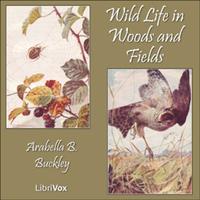SPIDERS ON THE COMMON
WHEN We cross the common on a fine summer morning we see many spiders' webs sparkling in the sun. The webs on the gorse bushes are round. They are fastened to the gorse prickles by long silk threads, and each web has spokes like a wheel. These spokes are joined together with rings of silk. There are drops of gum all over the rings. It is these drops which sparkle like diamonds, and make the web so pretty.
The spider spins a little tent in the centre of the web. In this tent she hides, till some insect flies against the gummy threads. Then she feels the web shake, and darts out to catch the fly before it breaks the threads.
We saw a little bee to-day fly right against the web on the gorse bush. Out came the spider from her tent. She bit the bee with her sharp fangs, tore off its wings, and then sat and sucked the juice out of its body.
Paul caught her, while she was busy, and showed us the two fangs with sharp points, which hang down in front of her head. Above them are her eight eyes, four large ones and four small ones. She has eight legs with such strange claws! Each one is like a comb. What do you think they are for? She uses them to guide the silk threads as she makes her web.
We turned her on her back and saw, under her body, six little pockets, out of which she pulls the silk. It comes out through tiny holes. She draws it through the combs on her legs, and so makes her web as she runs along.
Besides the webs on the gorse, there are webs all over the common close to the ground. These are not made with spokes like the round webs. The threads are mixed up like wool. For a long time we could not find the spider. At last one day Paul said, "Here is a hole right in the middle of the web. It goes down into the ground." This hole was lined with silk threads. Just then a beetle crawled on the web, and shook it. At once the spider darted out from the tunnel in the ground and seized the beetle. She was so quick that she had carried him down into her hole before we could catch her.
There are many spiders on the common which do not spin webs, though they hang from a thread. They spring on the flies and beetles on the ground and are called "hunting-spiders." The mother hunting-spiders carry their eggs about with them in a round bag. Peter caught one of these as she was running along with this white ball under her body. He took the ball away and put it on the ground. When he let her go, she ran up and seized it. He took it away three times. Each time she caught it up again, and at last ran away before we could catch her.

